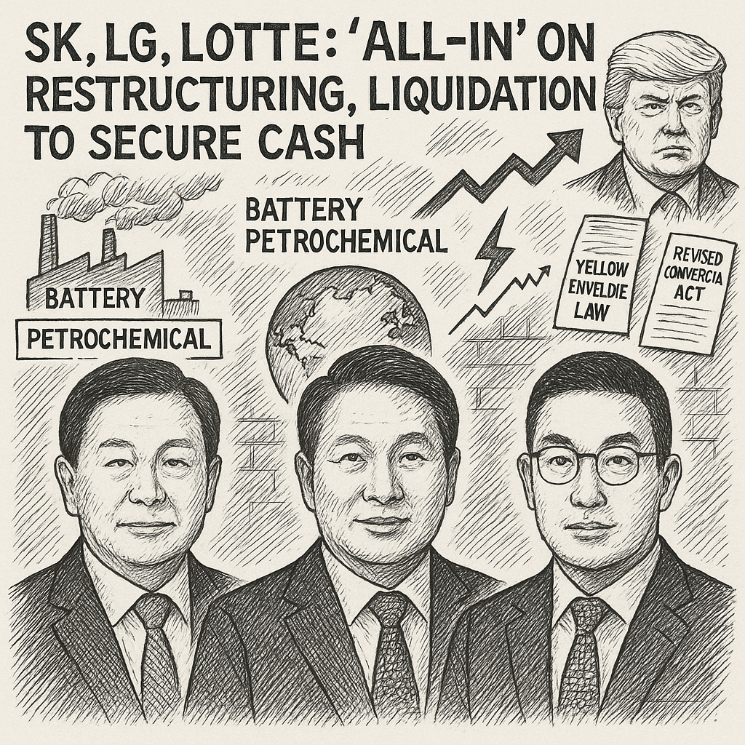 이미지 확대보기
이미지 확대보기SK, Lotte Initiate 'Cash Preservation Battle'
SK Group is extensively carrying out rebalancing (portfolio adjustment), including streamlining overlapping businesses among affiliates and divesting non-core assets. In March, SK Inc. significantly reduced its financial burden by selling an 85% stake in SK Specialty to private equity firm Hahn & Company for approximately KRW 2.6 trillion. Last month, it divested all its shares in Vietnam's VinGroup through a staggered third-party sale.LOTTE, whose credit rating was even downgraded after a liquidity crisis last year, is more committed to cash securing than any other domestic group. The challenge lies in the retail sector, including department stores and hypermarkets, which is primarily domestic-focused and offers limited upside. Lotte Chemical, which heavily expanded facilities during the boom, is struggling with cash generation after being directly hit by the petrochemical downturn originating from China.
Lotte Chemical has initiated securing KRW 2.3 trillion in cash through asset sales in the US, Pakistan, and Indonesia. The group is also making an all-out effort to secure cash by even collateralizing Lotte World Tower, a core group asset, with banks. Hotel Lotte, acting as the holding company, sold Lotte Rental for KRW 2.8 trillion at the end of last year.
LG Group is proactively responding to the crisis through selection and concentration. LG Display sold its 8.5-generation large LCD factory in Guangzhou, China, to TCL CSOT for approximately USD 1.5 billion. LG H&H is pursuing the sale of Haitai htb, its beverage subsidiary, to strengthen its core cosmetics business competitiveness.
Some industry observers analyze that LG H&H is even considering the sale of Coca-Cola (Korea Bottling Co.). LG Chem also divested its Water Solution business (KRW 1.4 trillion) and Aesthetics business including fillers (KRW 200 billion) this year. The Water Solution business was a profitable venture that earned KRW 65 billion in EBITDA last year, and the Aesthetics business was proactively divested despite expectations for future growth, to improve the financial situation shaken by the petrochemical downturn. LG Chem also plans to sell a portion of its shares in LG Energy Solution.
Hanwha Group is heavily benefiting from the defense industry boom, but simultaneously grappling with raising funds to support its petrochemical affiliates. According to the financial investment industry, as of the end of June, maturing debts within one year amount to KRW 2.8 trillion, including KRW 1.825 trillion for Hanwha Solutions, KRW 650 billion for Hanwha TotalEnergies, and KRW 335 billion for Yeochun NCC.
Companies Beset by Internal and External Woes
The current situation where domestic conglomerates are pursuing restructuring and liquidity securing did not arise suddenly. After the COVID-19 pandemic, excessive optimism about petrochemicals, electric vehicles, and batteries encouraged large corporations to expand capital expenditures.These large-scale capital expenditures were mostly financed through external borrowings, and with interest rates solidifying at high levels in recent years, financial costs have surged, exacerbating corporate financial burdens. An industry official explained, "As the downturn lengthens, it has become difficult to repay maturing bonds. Companies have no choice but to focus on divesting unnecessary businesses and defending cash liquidity." Indeed, the semiconductor, display, and petrochemical sectors have been grappling with prolonged stagnation due to the global oversupply from China, posing difficulties for Korean companies.
Furthermore, US President Trump's 'America First' policy, aimed at 'Make America Great Again (MAGA)', has amplified global economic uncertainty. Analysts suggest that the restructuring of US subsidy policies, including reciprocal and product-specific tariffs and the Inflation Reduction Act (IRA), along with strengthened protectionism, has left domestic conglomerates with no choice but to engage in a 'cash preservation battle'.
Moreover, it is pointed out that various laws and regulations, inevitably having a detrimental impact on overall business activities, are driving companies to the brink in this deteriorating global environment.
The Korea Employers Federation recently held an urgent press conference, appealing to the government and ruling party for careful handling, stating that "the Yellow Envelope Law and the revised Commercial Act are hindering the management and investment of domestic companies."
An industry official remarked, "The expansion of collective bargaining rights for primary and subcontracting companies could lead to indiscriminate spread of strikes, and mandatory cumulative voting could lead to intensifying management disputes and an influx of foreign speculative capital, raising concerns about adverse effects. A major problem is the lack of specific countermeasures beyond government guidelines."
Gwak Horyung (horr@fntimes.com)
[관련기사]
- SK Safeguards Battery Business with Cash Cow Enmove, While LG Sells Non-Core Growth Businesses
- 'Tariff-Heavy US,' 'Uncertain China': Samsung, Hyundai Motor, LG, POSCO, Lotte Seek Breakthrough in India
- SK Hynix Surges to 41% Operating Margin in Q2; Puts Full Force Behind HBM4 Pricing Defense
- SK On’s U.S. Battery Plant Hits Full Operation After 3 Years — A Turning Point Toward Profitability?
- Lotte Corporation Responds to Credit Rating Downgrade : “Uncertainty Resolved… Full Commitment to Improving Financial Soundness”
가장 핫한 경제 소식! 한국금융신문의 ‘추천뉴스’를 받아보세요~
데일리 금융경제뉴스 Copyright ⓒ 한국금융신문 & FNTIMES.com
저작권법에 의거 상업적 목적의 무단 전재, 복사, 배포 금지












![Samsung Electronics and SK Hynix Engage in High-Stakes AI Chip War [KFT Topic]](https://cfnimage.commutil.kr/phpwas/restmb_setimgmake.php?pp=006&w=284&h=214&m=5&simg=2026013013432407964141825007d12411124362.jpg&nmt=18)
![Hyundai Mobis Posts Record Results, Pivots to Robotics and Electrification [KFT Topic]](https://cfnimage.commutil.kr/phpwas/restmb_setimgmake.php?pp=006&w=284&h=214&m=5&simg=2026012911595100522141825007d12411124362.jpg&nmt=18)
![One Year In: CEO Hyun Shin-kyun Transforms LG CNS into KRW 6 Trillion AI Powerhouse [KFT Topic]](https://cfnimage.commutil.kr/phpwas/restmb_setimgmake.php?pp=006&w=284&h=214&m=5&simg=2026012807381208149141825007d12411124362.jpg&nmt=18)
!['Chung Eui-sun Declares Robot Management Era'... Hyundai Motor Group to Lead Robotics Age with 'Physical AI' [KFT Topic]](https://cfnimage.commutil.kr/phpwas/restmb_setimgmake.php?pp=006&w=284&h=214&m=5&simg=20260106111449071567492587736121125197123.jpg&nmt=18)
![Lee Jae-yong and Chey Tae-won, Korea's 'Semiconductor Duo,' Head to China... What's the Status of Local Operations? [KFT Topic]](https://cfnimage.commutil.kr/phpwas/restmb_setimgmake.php?pp=006&w=284&h=214&m=5&simg=2026010608232205705141825007d12411124362.jpg&nmt=18)
!['Beyond Mobile to Robotics': LG Innotek Continues Portfolio Expansion [KFT Topic]](https://cfnimage.commutil.kr/phpwas/restmb_setimgmake.php?pp=006&w=284&h=214&m=5&simg=2026010508201109906141825007d12411124362.jpg&nmt=18)
![Doosan Enerbility Eyes Return to 'A' Credit Rating After 9 Years on Nuclear Power and Gas Turbine Boom [KFT Topic]](https://cfnimage.commutil.kr/phpwas/restmb_setimgmake.php?pp=006&w=284&h=214&m=5&simg=2026010208511504157141825007d12411124362.jpg&nmt=18)
!["Samsung Is Back," Chip Chief Declares, Eyeing Record Profit on HBM Recovery [KFT Topic]](https://cfnimage.commutil.kr/phpwas/restmb_setimgmake.php?pp=006&w=110&h=79&m=5&simg=2026011408580109459141825007d12411124362.jpg&nmt=18)
!['Expansion' S-OIL vs. 'Caution' GS Caltex [KFT Topic]](https://cfnimage.commutil.kr/phpwas/restmb_setimgmake.php?pp=006&w=110&h=79&m=5&simg=2026012010260905723141825007d12411124362.jpg&nmt=18)
![Koo Kwang-mo's Vision for AI and Robotics Drives LG Group's Transformation [KFT Topic]](https://cfnimage.commutil.kr/phpwas/restmb_setimgmake.php?pp=006&w=110&h=79&m=5&simg=2026012123034202714141825007d122461258.jpg&nmt=18)
![One Year In: CEO Hyun Shin-kyun Transforms LG CNS into KRW 6 Trillion AI Powerhouse [KFT Topic]](https://cfnimage.commutil.kr/phpwas/restmb_setimgmake.php?pp=006&w=110&h=79&m=5&simg=2026012807381208149141825007d12411124362.jpg&nmt=18)
![Samsung's 'Last Chance': Lee Jae-yong Pushes HBM4 as Make-or-Break Moment [KFT Topic]](https://cfnimage.commutil.kr/phpwas/restmb_setimgmake.php?pp=006&w=110&h=79&m=5&simg=2026012623242806011141825007d122461258.jpg&nmt=18)